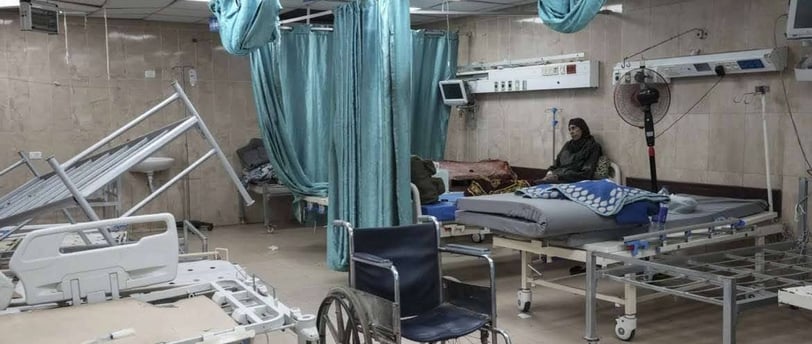Gaza’s Health System Nearing Total Collapse Amid Severe Medical Shortages
Gaza's health sector nears total collapse as laboratories and blood banks face critical shortages. Only 19 hospitals remain partially functional, and vital medical services risk complete shutdown amid war, siege, and famine.
NEWS
Refaat Ibrahim
6/21/20253 min read


Laboratories and Blood Banks on the Brink: 49% Deficit and Imminent Shutdown
The health system in the Gaza Strip is on the verge of total collapse, particularly in laboratory and blood bank services, as Israeli military aggression continues alongside a strict siege and border closures.
A senior medical official at a government hospital in central Gaza warned that the laboratory crisis has reached an alarming level, with extreme shortages in essential testing supplies and materials for drawing and storing blood. This shortage is directly impacting the ability of medical teams to treat patients and war-wounded civilians, especially with rising daily casualty numbers.
A Ministry of Health official has sounded the alarm about an imminent collapse of laboratory and blood bank services, stressing that without immediate resupply, patients will be denied critical diagnoses and follow-up care, particularly in life-threatening cases.
The shortage in laboratory materials and consumables, such as blood draw tubes and basic testing kits, has reached 49% of required capacity. One of the most alarming gaps is in blood bags, which are scarce not only due to a famine-related drop in donors but also because of a severe lack of the tools and materials necessary for safe blood collection and storage. If this persists, blood services could fully halt within two weeks.
Before the war began on October 7, 2023, Gaza had 12 operational hospital laboratories, but 6 were completely destroyed by Israeli strikes, and 2 others (Gaza European Hospital and Al-Durra Hospital) were shut down due to forced evacuations. Today, only 4 labs remain functional in the north and south of the strip.
In primary healthcare centers, about 60% of laboratories are out of service, either due to direct destruction or the shutdown of the health facilities they are housed in. Furthermore, 60% of essential laboratory equipment is nonfunctional due to damage or a lack of spare parts. The remaining equipment is outdated, overused, and liable to fail at any moment.
Medical sources indicate that laboratories are no longer capable of diagnosing diseases linked to poor environmental and sanitary conditions in refugee camps, and services for cancer patients have ceased entirely following the destruction of the central diagnostic lab.
In a critical escalation, Israeli forces destroyed Gaza’s public health laboratory, the only facility specialized in testing water, food, and medication safety, dramatically increasing the risk of widespread disease and contamination.
Even private laboratories have been paralyzed, unable to obtain testing materials due to the Israeli blockade. This has pushed more pressure onto the crumbling public health sector. The Ministry of Health has urgently called on international agencies to intervene and prevent the total collapse of what remains of Gaza’s diagnostic infrastructure.
Hospitals Face Closure Amid Fuel and Water Crises
With over 620 days of continuous Israeli bombardment and siege, Gaza’s healthcare infrastructure is nearing complete collapse due to systematic destruction and blockade.
According to the World Health Organization (WHO), only 19 out of 36 hospitals remain partially operational, with the majority of health facilities destroyed or out of service. More than 700 attacks on healthcare facilities have been documented since the war began.
Fuel shortages are catastrophic, disabling ICUs and ventilators and placing hundreds of lives at immediate risk. Major hospitals such as Nasser Medical Complex and Al-Nasr Hospital are on the verge of full shutdown.
In addition, less than half of Gaza’s water facilities are functional, leaving shelters and displaced populations vulnerable to waterborne diseases amid the accumulation of waste and lack of clean water.
Catastrophic Consequences for Patients and the Wounded
The overwhelmed health system is incapable of handling the influx of wounded and chronically ill patients. For example, Al-Shifa Hospital treats over 400 cases daily yet faces acute shortages in surgical tools, anesthetics, and disinfectants.
As displacement, flooding, and infrastructure collapse worsen, communicable diseases have surged, including skin infections, respiratory illnesses, and gastrointestinal conditions. Alarmingly, polio has re-emerged due to the complete halt of vaccination campaigns.
Cancer and kidney failure patients are also severely impacted, as treatment centers and specialized devices are now nonfunctional.
Medical Staff Under Targeted Attack
Local reports confirm that more than 1,000 healthcare workers, including doctors, nurses, and paramedics, have been killed since October 2023, while over 310 others have been detained or disappeared. This has left the sector severely short-staffed.
The World Health Organization estimates that 84% of Gaza’s health infrastructure has been partially or completely damaged, and the cost of rebuilding the healthcare system now exceeds $550 million.
Conclusion: Gaza’s Health System Faces Imminent Collapse
Hospitals risk shutting down in the coming days due to lack of fuel and medical supplies.
Laboratories and blood banks may cease operating within two weeks if urgent aid is not delivered.
Disease outbreaks are escalating amid water and sanitation collapse and overcrowding.
Medical staff are being killed, arrested, or overwhelmed, paralyzing relief and diagnostic efforts.
Patients and the wounded face deadly risks due to lack of life-saving care.
Urgent Solutions Needed
Saving Gaza’s healthcare system requires immediate international action.
Lift the blockade immediately to allow medical aid and fuel entry.
Unrestricted delivery of essential supplies, especially for diagnostics and emergency care.
Emergency intervention from global health organizations to rebuild and restore services.
Guarantee international protection for health workers and facilities under international law.
Awareness
Documenting reality, amplifying Palestinian voices, raising awareness.
Contact Us:
resistant.p.pens@gmail.com
Follow our social media
